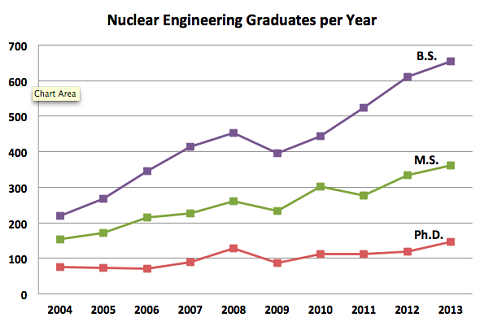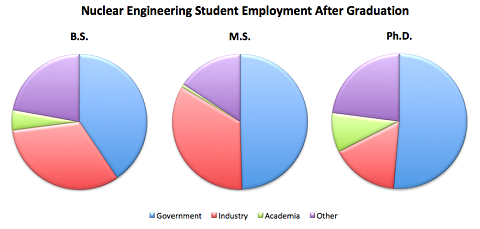Where Do Nuclear Engineering Students Work After Graduation?
Earlier this month, the Oak Ridge Institute for Science and Education (ORISE) published its annual survey on nuclear engineering enrollment and degrees (check out the full report here). The 2013 data shows enrollment and the number of graduates in nuclear engineering programs along with a survey of where students are working after graduation.
There are a total of 32 universities granting nuclear engineering degrees or nuclear engineering options within another major in the United States. In 2013, a total of 655 students graduated with a Bachelor of Science, 362 with a Master of Science, and 147 with a Doctorate in nuclear engineering. Universities graduating more than 50 nuclear engineering students last year, starting with the largest programs, include:
- Pennsylvania State University
- University of Michigan
- University of Tennessee
- Texas A&M University
- University of Illinois at Urbana-Champaign
- Georgia Institute of Technology
- Purdue University
- University of Wisconsin-Madison
- North Carolina State University
- Oregon State University
The number of students graduating from nuclear engineering programs continues on a considerable upward trend over the past decade, as shown in the figure below. More recently, total enrollment has dropped 9 percent for undergraduates and 5 percent for graduate students since 2012. The overall trend of increasing graduation rates can likely be attributed to the "nuclear renaissance" in the United States and globally that was gaining momentum around 2008, and thus students attracted to the growth of the nuclear industry at that point would be graduating about now. The slight dip in enrollment rates more recently might be attributable to the accidents at the Fukushima Daiichi nuclear power plant that occurred in 2011, resulting in a slowing down of the nuclear renaissance worldwide. ORISE expects the number of bachelor's nuclear engineering graduates to level to about 600 per year over the next couple of years.
The ORISE survey also included data on where nuclear engineering graduates find employment after graduation. Unfortunately, the post-graduation plans of a third of the total students are unreported or unknown. Another 7 percent report seeking employment. Taking out the unknown data, we can still get some interesting insight into where nuclear engineering students are going after graduation.
First of all, nearly half of graduating students continue with school to obtain higher degrees or serve in a post-doctorate position. This reflects the intense research and technical nature of the nuclear field. As for graduates who seek employment, the chart below shows where students are going to work with different degrees. The government sector includes local, state, and federal government along with military and government contractors. Industry includes working at a nuclear utility or other nuclear-related industry. Academic employment does not include continued study. And the "other" category includes employment in other industries and foreign (non-U.S.) employment.
Graduates with a B.S. in nuclear engineering tend to work in industry more so than graduate students, while graduate students have a higher proportion working in government. Many more Ph.D. students work in academia as professors and fewer enter the nuclear industry. When making the case to the federal government to support nuclear engineering education, it is interesting to note that nearly half of all nuclear engineering students work for the government after graduation.
__________________________
 Lenka Kollar is the owner & editor of Nuclear Undone, a blog and consulting company focusing on educating the public about nuclear energy and nonproliferation issues. She is an active ANS member, serving on the Nuclear Nonproliferation Technical Group Executive Committee, Student Sections Committee, and Professional Women in ANS Committee. Connect with Lenka on LinkedIN and Twitter.
Lenka Kollar is the owner & editor of Nuclear Undone, a blog and consulting company focusing on educating the public about nuclear energy and nonproliferation issues. She is an active ANS member, serving on the Nuclear Nonproliferation Technical Group Executive Committee, Student Sections Committee, and Professional Women in ANS Committee. Connect with Lenka on LinkedIN and Twitter.












